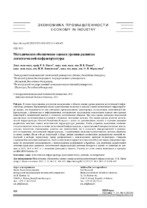Методическое обеспечение оценки уровня развития логистической инфраструктуры

Date
2022Publisher
Another Title
Methodological Support for Assessing Development Level of Logistics Infrastructure
Bibliographic entry
Методическое обеспечение оценки уровня развития логистической инфраструктуры = Methodological Support for Assessing Development Level of Logistics Infrastructure / Р. Б. Ивуть [и др.] // Наука и техника. – 2022. – № 5. – С. 426-435.
Abstract
В статье представлены результаты исследования в области оценки уровня развития логистической инфраструктуры регионов. Проведенный анализ существующих подходов и методов оценки логистической инфраструктуры выявил, что большинство из них учитывают преимущественно транспортную составляющую логистической инфраструктуры, а финансовая и информационная составляющие представлены показателями прямых иностранных инвестиций в человеческий капитал и стоимости логистических объектов. При этом оценка некоторых показателей производится исследователями в основном с помощью экспертных методов. Для оценки уровня развития логистической инфраструктуры областей Республики Беларусь с целью их сравнительного анализа и изучения динамики разработана методика оценки логистической инфраструктуры регионов. Чтобы устранить выявленные особенности существующих подходов к оценке логистической инфраструктуры, в представленной авторами методике использовались показатели, описывающие развитие как транспортной, так и складской, информационной и финансовой составляющих логистической инфраструктуры, с применением экономико-математических методов обработки и оценки данных. После отбора показателей и сбора данных оценивали соответствие распределения значений показателей в выборке нормальному закону распределения с использованием критерия Колмогорова – Смирнова с проверкой на мультиколлинеарность. Далее осуществляли перевод всех показателей в одну шкалу измерения и проверку их внутренней согласованности с использованием коэффициент Кронбаха. Для апробации разработанной методики проводили сравнение логистической инфраструктуры регионов Беларуси и оценку ее динамики по данным за 2015, 2018 и 2021 гг. с помощью факторного анализа. Расчеты по всем этапам выполняли в программе IBM SPSS Statistics 20.
Abstract in another language
The paper presents the results of a study in the field of assessing the level of development of the logistics infrastructure of the regions. The analysis of existing approaches and methods for assessing the logistics infrastructure revealed that most of them take into account mainly the transport component of the logistics infrastructure, and the financial and information components are represented by indicators of foreign direct investment in human capital and the cost of logistics facilities. At the same time, the assessment of some indicators is carried out by researchers mainly with the help of expert methods. To assess the level of development of the logistics infrastructure of the regions of the Republic of Belarus for the purpose of their comparative analysis and study of the dynamics, a methodology has been developed for assessing the logistics infrastructure of the regions. In order to eliminate the identified features of existing approaches to the assessment of the logistics infrastructure, the methodology presented by the authors used indicators that describe the development of both the transport and storage, information and financial components of the logistics infrastructure using economic and mathematical methods for processing and evaluating data. After selecting indicators and collecting data on them, an assessment was made of the correspondence of the distribution of indicator values in the sample to the normal distribution law using the Kolmogorov – Smirnov criterion with a check for multicollinearity. Further, all indicators were transferred to one measurement scale and the internal consistency of the indicators was checked using the Cronbach coefficient. To test the developed methodology, a comparison was made of the logistics infrastructure of the regions of the Republic of Belarus and an assessment of its dynamics based on data for 2015, 2018 and 2021, using factor analysis. Calculations for all stages of the developed methodology were carried out using the IBM SPSS Statistics 20 program.
View/
Collections
- № 5[11]
